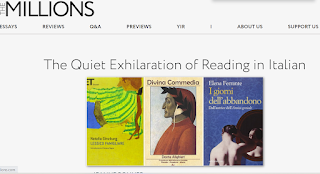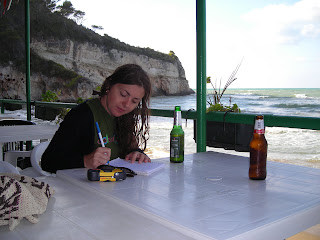 When my aunt and uncle
embarked on a trip to Florence last year (after an absence of 40 years!), I
realized I have slightly skimped on travel tips here on Ciambellina or in some
cases not organized the posts with tips well so I am going to try to unite
everything here in one post. Everything you -- my friend, my Ciambellina
reader, my cousin, my uncle -- need to know in order to have a special trip to
Florence, Italy (where I still live in my heart). You can thank Aunt Maureen
and Uncle Pat!
When my aunt and uncle
embarked on a trip to Florence last year (after an absence of 40 years!), I
realized I have slightly skimped on travel tips here on Ciambellina or in some
cases not organized the posts with tips well so I am going to try to unite
everything here in one post. Everything you -- my friend, my Ciambellina
reader, my cousin, my uncle -- need to know in order to have a special trip to
Florence, Italy (where I still live in my heart). You can thank Aunt Maureen
and Uncle Pat!
Before I get to specific
tips and itineraries, let me mount my linguistic soap box: learn some
Italian before you go.
Not to be nice or
cosmopolitan, and not to improve the American image abroad.
But rather because: speaking
Italian with an Italian is one of life's special pleasures.
The other major bits of advice:
*Walk as much as possible
*Visit the main produce markets
*Have a ciambellina (and bring a few back for me).
OK, sermon over.
Where to go
Assuming you will tick off
the major sites listed in your guide book or online (the Duomo, the Uffizi, l'Accademia, San Marco, Cappella Brancacci, etc.), I will move onto advice
about other attractions in Florence.
One of the main recommendations I want to make is:
Visit the Villa and Giardino Bardini. Most people visit
Boboli Gardens, which is quite lovely but I think the Bardini is even better.
The gardens are gorgeous [terraced in some parts] and the views stunning. When
I was in Florence last summer, our ticket somehow got us entry to both, though
I don't know how you would visit both in one day and see everything.
(Note, they are both on the other side of the river).
Also on the other side of the river: Forte
Belvedere and Piazzale Michelangelo. I recommend walking to both, but have
your walking shoes handy. Both sights are gorgeous, with views equally as
gorgeous. There's likely some important historical note someone else could tell
you about.
There are also specific corners of the city that I
love. I'll start with piazzas:
Piazzas I love (to walk through, to stroll through, to
gaze at, to sit in)
Piazza Santo Spirito
Piazza del Carmine
Piazza dei Ciompi
Piazza della Repubblica (now with a carousel)
Piazza della Signoria
Quirky neighborhoods
Santa Croce: the
area across from the piazza and the church was originally settled by Etruscans
and it's one of the few places in the city where roads curve. There are some
tiny, hidden piazzas and viuzze here that are fun to discover.
Piazza Torquato Tasso: Real people live in this neighborhood! Locals
gather to play soccer in the park at the center of the piazza and you could go
over to Al Tranvai if you wanted authentic but decidedly unfussy Florentine
food.
Speaking of which...
Where to eat
I mentioned Trattoria Cammillo (Borgo San Iacopo, #57R)
in a previous post about restaurants in Florence because it's a place that I
like (and Beyonce also liked it!).
Cibreo is
also good -- there are actually multiple Cibreo storefronts in the same
basic area, depending on your budget (Via Andrea del Verrocchio #8R). Here
are some other recommendations:
https://ciambellina.blogspot.com/2015/05/where-to-eat-in-florence-update.html
Note, a lot of the places I like are on the other side
of the river and two are in Piazza Santo Spirito: Trattoria
Casalinga and Borgo Antico. The piazza is also quite lovely (see above) and the
church was my father's favorite (designed by Brunelleschi).
I also love Ristorante Caffe Italiano on
my old street, Via della Vigna Vecchia.
Where to eat and shop
for dinner
I really like going to the public produce markets in
Florence and the two main ones in centro are the Mercato di
San Lorenzo (by the station; it is the best-known) and the Mercato
Sant'Ambrogio; this last one is where I did do my shopping. It is
east of Santa Croce -- and has fantastic cheese, sliced meats, veggies,
etc.
The San Lorenzo produce market -- the main market -- is
now a wonderful place to dine and shop. You have to wade through the outdoor
flea market surrounding the market to reach it but it's worth it.
Not just where to eat but
what
People rave about pasta
but here's a secret: Italian sandwiches are divine. Note: in the Old Country,
they are nothing like a sub or a hero. Freshly made and reflective of all the
Italian culinary acumen we've come to expect in pasta dishes, the Italian
sandwich you can buy at a bar is something not to miss. Antico Noe is
one of the best places for sandwiches, and not only because it is literally
tucked inside a medieval arch a half-mile from Piazza Santa Croce (with a view
of a medieval tower I once lived atop, but that's neither here nor there).
Other highlights:
Crostini -- as an
appetizer. In the event these are new to you: little toasted slices of bread
with toppings, including chicken pate, freshly-chopped tomatoes, mushrooms,
etc.
Prosciutto crudo -- I
believe it's part of Italy's culinary patrimony and I am not joking. Salty,
silky, delicious. I don't care if you're a vegetarian -- my Italian friends
certainly didn't when I pretended to be one in college and they kept urging me
to eat prosciutto!
Cinghiale -- Wild boar.
It's used often as the main ingredient of an amazing pasta dish that I suggest
you order: pappardelle al cinghiale. It's available everywhere!
Porcini mushrooms -- if
they are in season
Fiori di zucca (zucchini
flowers) -- fried or stuff
Italian pastries -- Forget
gelato. The real treats in Italy are pastries. Look for bars that say
'produzione propria' (that means they make their own pastries) or head to
a pasticceria.
(Also grab a chocolate bar at the supermercato/alimentari if it has whole nocciole in it -- the big nut at the center of the baci candies. Why have one nocciola when you can have an entire chocolate bar full of them?)
Where to walk...
In addition to
"everywhere," I also recommend walking to the other side of the river
-- often. From there, as I've mentioned, you can walk to Forte Belvedere,
Piazzale Michelangelo and the Bardini gardens.
Indeed some of the nicest walks are in
the area around San Niccolò (the other side of
the river) because they allow you to get outside the walls of the city and go
up into the hills. One place you could try walking to is Forte
Belvedere.
Where to have a coffee and step onto a page of A
Room With A View:
There
are old-school caffes that make your morning coffee feel royal and four of them are on
Piazza della Repubblica, of which Caffe Gilli is probably the best
(coffee/pastries/aperitivo etc); also the Rivoire on Piazza della Signoria will
make you feel as though you're a wealthy landowner.
Where to drink wine
Everywhere! That's one of the things that makes Italian
coffee bars special -- you can order a caffe latte in the morning and un
bicchiere di vino rosso in the evening!
But I will give one recommendation of a place to drink:
Rose's on Via del Parione; it's on one of the more beautiful streets in the
center city. Drink outside at one of the tiny tables where you can watch fancy
Florentines walk and bike by.
Look for a place called 'enoteca' to sample some good wine. I also love the hole-in-the wall (literally) kiosks where you stand on the street at a counter and order a glass of wine and maybe a sandwich.
Pastries
You'll find an entry for gelato below but as I
mentioned, I think paste or pasticcini [pastries]
are the unsung sweets of Italian cities (unsung, I should say, by Americans.
Italians know). And really, by now, you should know my favorite: la
ciambellina (looks like a donut if a donut was baked in God's kitchen).
Also good: un bombolone (similar but without the hole and typically filled
with crema).
Gelato
Vivoli (Via Isola delle Stinche) around the corner from
our old apartment is very popular and also very good but so is Festival del
Gelato right off of Piazza della Repubblica (down the block from the Duomo).
Also good (and popular): Gelateria Carraia and Gelateria Santa Trinita (both
are stationed on the other side of two consecutive bridges across the River,
Oltrarno side).
Souvenirs
I still buy souvenirs and so should you! I favor paper
goods because reading in Italian is my passion (and paper was an ancient
Florentine art) so my suitcase is always loaded down with novels and magazines
but the category also includes notepads, calendars and the like, which would
appeal to anyone.
I find some of the best souvenirs can be had at the big
bookstore on Piazza della Repubblica: Libreria Edison (there
are also lots of kiosks right in front of the bookstore that may have something
you like). In addition, I highly recommending visiting the Bialetti store for
the classic Italian Moka coffee pot (and coffee cups and other accessories).
Lastly, I know some of you out there are real foodies
so I recommend checking out a website published by a local Florentine food
writer who knows her stuff (and has Catholic interests -- hugely into sushi,
etc.):
https://www.ioamofirenze.it/
She recently published a guide on her blog to choosing
a restaurant in Florence:
https://www.ioamofirenze.it/mi-consigli-un-ristorante/
Note, it's in Italian but all the addresses you see
everywhere (on maps, for hotels, etc) are in Italian anyway and the names of
restaurants are in Italian on the sides of buildings so if you really want to
go somewhere, you'll figure it out. I suggest choosing something from her guide under the
category 'Trattorie tipiche' ('local, traditional eateries'), with the name of
the restaurant in bold at the start of each entry (then Google the name of the
restaurant and figure out where it is). She also has a heading for fine dining
(in English) and if you have the euros, go for it!
Buonviaggio!
-30-


















